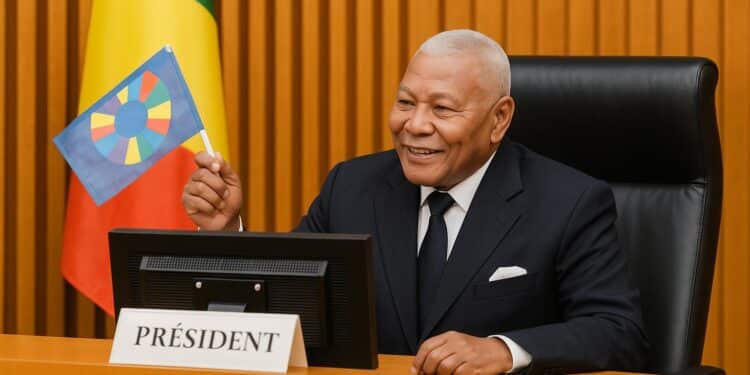Political horizon ahead of 2026 vote
With barely nine months separating Brazzaville from the March 2026 presidential vote, senior lawmakers have begun to weigh the record and prospects of President Denis Sassou Nguesso. At the National Assembly’s August 2025 closing session, Speaker Isidore Mvouba offered an emphatic reading of the moment.
He praised the head of state as “the man of difficult situations,” a formulation that echoes slogans used since the early 2000s, yet his address also highlighted metrics by which Congo’s political class judges continuity: macro-economic stabilisation, debt renegotiation and security stewardship.
The 80-year-old president has not formally declared his candidacy. Still, ruling Congolese Labour Party stalwarts, trade-union leaders and several opposition figures who split from the 2021 coalition believe the electoral calendar favours an early endorsement that would allow administrative preparations to proceed smoothly.
Already, the independent electoral commission has begun mapping polling stations and upgrading biometric kits acquired with UNDP support in 2022, a process observers from the African Union say will be crucial for avoiding the technical delays that hampered local polls last year.
Economic reforms underpinning stability
At the heart of Mr Mvouba’s speech lay economic performance. Congo’s growth rebounded to 4.3 percent in 2024, buoyed by higher oil prices and nascent agricultural exports, according to the World Bank, while inflation cooled to single digits after peaking during the pandemic.
Beyond hydrocarbons, the government has opened agro-industrial corridors such as the Loudima agri-hub and the N’Kayi distillery. Officials argue that domestic processing could reduce import bills and create rural jobs, a strategy aligned with the IMF-backed Extended Credit Facility renewed in July 2023 programme.
Parliament has simultaneously tightened public-finance oversight. A debt-sustainability law passed in May 2025 obliges the treasury to cap new borrowing at three percent of GDP, echoing CEMAC convergence criteria. Credit-rating agencies welcomed the move, noting Congo’s ratio fell from 98 to 77 percent in two years.
Social investment and health advances
Social indicators, though improving, remain fragile. The United Nations estimates youth unemployment at 20 percent. To address this, the Fund for Impulse and Guarantee has issued more than 11,000 micro-loans since 2023, prioritising women-led enterprises and fintech start-ups expanding mobile-money penetration beyond urban centres.
In the health sector, two general hospitals, in Ouesso and Sibiti, are scheduled to open before year-end. The African Development Bank, which co-financed the projects, expects them to cut referral times for specialised care by half, alleviating pressure on Brazzaville’s over-stretched Teaching Hospital.
Climate resilience and regional diplomacy
While Mr Mvouba lamented global conflicts, he equally underscored climate shocks that hit Congo. Torrential rains in June 2025 displaced 4,500 families in the capital, according to UN OCHA. Government relocation programmes in Kintélé and Djoué have begun delivering prefabricated housing with water and photovoltaic installations.
On the diplomatic front, Brazzaville has positioned itself as a mediator in regional crises. Foreign Minister Jean-Claude Gakosso chaired an ECCAS meeting in July, urging Sudanese factions to revive the Juba Peace Agreement. Observers credit the initiative with securing a fragile humanitarian corridor.
Domestically, security indicators remain comparatively stable. The UN Office for Central Africa reports that incidents involving armed groups in the Pool region dropped by 60 percent between 2022 and 2024 after community-based reconciliation schemes spearheaded by the president’s advisory committee on post-conflict reintegration.
Governance, opposition and international confidence
Opposition parties, including the Pan-African Union for Social Democracy, acknowledge the improvement but demand more transparency over public tenders and electoral lists. Party spokesperson Guy-Price Parfait Kolélas told local radio that ‘confidence grows when institutions demonstrate impartiality,’ a remark echoed by civil-society monitors.
In response, the interior ministry has invited international experts to audit the voter registry. A pilot project using blockchain hashes for data integrity, funded by the European Union’s Electoral Support Programme, will be tested in two departments, signalling a tech-forward approach to credibility.
Foreign investors are monitoring the governance debate closely. French energy firm TotalEnergies signed a $600 million deal in June 2025 to expand gas processing at Pointe-Noire, contingent on fiscal clarity and local-content guarantees. ‘Predictability is our main ask,’ an executive said after the signing ceremony.
Multilateral lenders share the sentiment. The IMF’s latest review applauded progress on budget realism but urged quicker subsidy rationalisation to free resources for social spending. Brazzaville, for its part, insists reforms must be sequenced to safeguard purchasing power amid volatile international commodity markets.
Stability calculus of the electorate
Within civil society, the tone is cautiously hopeful. Surveys by the Congolese Centre for Strategic Studies show 68 percent of respondents value stability over leadership renewal, yet 59 percent also want greater youth representation in state institutions, suggesting a nuanced mandate for the next administration.
Whether President Sassou Nguesso chooses to formalise his bid before year-end or closer to the February deadline, the convergence of economic recovery, infrastructural upgrades and relative calm affords him political capital. Diplomats in Brazzaville, however, stress that transparent procedures will ultimately legitimise whichever outcome voters deliver.












































